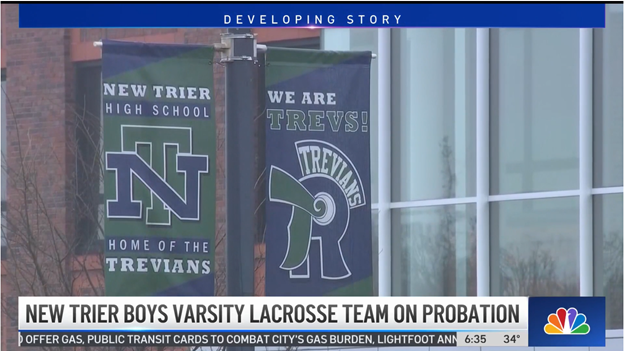Hazing incident elicits concern and provides lessons
April 22, 2022
The New Trier boys varsity lacrosse team has been subjected to intense scrutiny following the release of a video depicting a vulgar initiation exercise. The incident, which provoked the New Trier administration to place the team on a two-year probation, has made appearances on a vast array of publications, and has conjured substantial notoriety for both the lacrosse team and the high school.
In response to the scandal, New Trier sophomores have forged a united front of opposition to the initiation exercise, voicing their disapproval of the lacrosse team’s conduct. In particular, students have objected to the notion of an initiation itself. Liam Fitzgerald, a three-sport athlete, finds initiation exercises to be divisive, and altogether detrimental to the unity of a team: “I think initiation exercises separate people, and contribute to a lack of chemistry that often results in worse play on the field.”
Moreover, Trevians contend that the extent of the lacrosse hazing incident is extreme, and defies typical practices of New Trier athletics. According to William O’Donnell, a varsity rower, violent hazing incidents amongst varsity athletes are effectively unprecedented, stating, “I have not heard of any similar situations occurring.” However, O’Donnell acknowledged the ambiguity surrounding the situation. “It is possible that this situation occurs elsewhere,” he said. “This incident just happened to be documented.”
Further, the lacrosse team’s hazing incident has strained what once were extremely strong ties between New Trier’s lower and upper classes. The team’s actions have diminished the trust between the younger and older students of New Trier. Prior to the revelation of the incident, underclassmen viewed junior and senior athletes as pillars of the New Trier community. Their representation of New Trier on the athletic field conformed to the values that the school willfully represents. Now, New Trier sophomores seek to disassociate themselves with the athletes who committed the scandal.
Ari Libby, a sophomore athlete, voiced feelings of betrayal regarding the conduct of the lacrosse team: “The behavior makes me question the people that represent our school in sports. The people that represent our school should uphold the values of New Trier.”
Although the behavior of the lacrosse team has served as a detriment to the cohesiveness of New Trier’s student body, there is optimism that this incident may yield some benefit. The sheer magnitude of this controversy, coupled with the severe backlash articulated by students, should discourage future hazing incidents. Student-athletes are now keenly aware of the implications that their hazing rituals may bear. Students at New Trier possess no ambition to summon the negative publicity that the lacrosse team has, and they may now shy away from committing similar enormities.











































